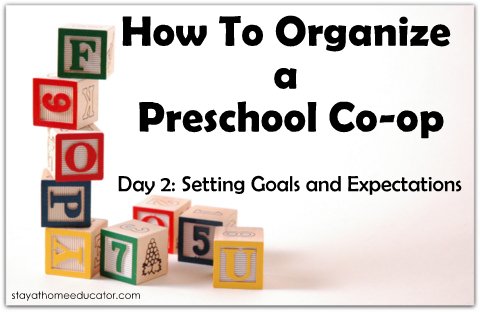This is day two of a five post series about how to organize and run a preschool co-op. This five post series began on June 17, 2013 and will run through June 21, 2013. Please join in by subscribing to receive posts via E-mail, RSS, on Facebook, and on Pinterest.
If you missed a post, you can find it below.
How to Organize a Preschool Co-op: Overview Day 1: Finding and Selecting Participants
Day 2: Setting Goals and Expectations
Now that you have others who will join in the work and fun, this post will focus on how to set goals and expectations for the group.
The Goals of Preschool
The most important question to answer under this category is “What are your goals for preschool?” By this, I mean to ask what do you wish for your child to gain from this preschool experience. Depending on the age of your child and when he will be entering kindergarten, your answer and the response of the participating mothers in your group may differ slightly.
During the planning stages of preschool co-op this last year, there was a general consensus that we wanted our children to experience a more formal school-like atmosphere. We wanted our children to become familiar with taking direction from other adults and learn to follow a specific and set routine during various parts of the preschool morning. We wanted preschool to help socialize our children by teaching them more about how to resolve conflicts with peers, how to take turns and how to deal with frustration and disappointment appropriately. We also wanted preschool co-op to begin preparing our children academically by teaching the alphabet and letter sounds, as well as counting and other math skills. But…we all knew we wanted a safe, loving and nurturing environment for our children, too. We wanted preschool co-op to be a place where the children could express their little personalities in a place where their talents and curiosity could be cultivated.
Academic Versus Play-Based Education
Before you get any further, your preschool co-op needs to determine if their goals are more academic based, or play based. (For an article where I compare the benefits of each, Academic vs. Play Based Early Childhood Learning). Start by reading my article I mentioned, and then decide as a group if the social experience for your child or the gain in academic skills is more important, or if there a consensus that a careful balance of both will best meets the needs of the children. My preschool co-op has always done a fine mixture of both skills based and play based education.
Parent Expectations
This is an important step to the success of any preschool co-op that cannot be missed. Every preschool co-op must set expectations for the parents. My co-op set some of the following expectations:
Parents will…
- bring their child to school on time and pick them up on time
- not miss any school days unless it is completely unavoidable
- inform the teaching mother when a child will not attend school
- split all supplies/curriculum costs equally among the other sets of parents
- be willing offer craft supplies to the current teaching mother when asked
- be willing to share in the cost of snacks when asked
Child Expectations
I know this may sound a little funny, but the participating mothers should also set expectations for their children while in preschool. This helps the teaching mother know how and when to discipline and it helps the children become familiar with that formal school-like atmosphere I stated earlier. Not to mention that three and four year olds want to make their own choices and are very comfortable with being slightly defiant. My co-op set some of the following expectations:
Children will…
- be positive about learning and activities (no, “I hate this,” or “This is boring.”)
- participate in each activity, or sit out and read until willing to participate (no, “I don’t want to.”)
- follow the instructions of the teaching mother (no, “No!”)
As a group, discuss what kinds of consequences will follow if a child chooses not to follow the set expectations. Maybe a gentle reprimand is appropriate, or a short time-out. Maybe a loss of privileges, such as choice time or recess time, or a brief chat with the parent.
What To Do Now
Write down what your goals and expectations are for your child’s preschool experience. Knowing your own expectations will help your group make decisions as a whole. When doing this, think visually. Picture your child in preschool and play out the day like a movie. What you see your child doing? Surely you imagine your child vary happy and excited about preschool, so define what will make that happen…and write it down. If you need to, visit some preschools around your area to get a feel for how different each one can be. This can also give you some ideas of things you really feel are important, as well as demonstrate to you some things you may not completely agree with. Keep notes to share with the participating mothers.
Once you have your own vision clarified, arrange a meeting/play date with all the other mothers to discuss the contents of today’s post. Make it a goal to have your goals and expectations set by the end of that meeting. Take notes on every detail. (Trust me, you’ll refer back to them).
This five post series began on June 17, 2013 and will run through June 21, 2013. Please join in by subscribing to receive posts via E-mail, RSS, on Facebook, and on Pinterest.
Sneak Peek: Day 3: Selecting Learning Materials
You know what the goals and expectations are, so now it is time to select learning materials that meet those expectations. For example: Are you buying a curriculum? Are you writing your own curriculum? Buying workbooks? How are materials to be paid for? What is the sequence of learning concepts? Are you following state standards, if available? Etcetera.
For other posts in this series
How To Organize a Preschool Co-op: Overview Day 1: Finding and Selecting Participants Day 2: Setting Goals and Expectations Day 3: Selecting Learning Materials Day 4: Determining Duration and Frequency Day 5: Assigning Roles and Responsibilities
I’m Sarah, an educator turned stay-at-home-mama of five! I’m the owner and creator of Stay At Home Educator, a website about intentional teaching and purposeful learning in the early childhood years. I’ve taught a range of levels, from preschool to college and a little bit of everything in between. Right now my focus is teaching my children and running a preschool from my home. Credentials include: Bachelors in Art, Masters in Curriculum and Instruction.


These are great ideas, and not just for co-ops for to keep in mind for teaching your own children at home. One of my favourite game and activity books is written as a guide to setting up a co-op. I’ll be subscribing to your blog in a moment so I don’t miss anything. Thank you for linking up with Mom’s Library. I’ll be featuring you tomorrow on http://www.crystalstinytreasures.com